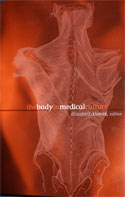September 09, 2009
Klaver’s new book focuses on today’s medical culture
CARBONDALE, Ill. -- At first glance, Elizabeth Klaver’s latest book looks like a medical text of some sort. The several illustrations in the book seem to support that notion.Yet, Klaver is an English professor in the College of Liberal Arts at Southern Illinois University Carbondale -- not part of the School of Medicine at all. Why is an English professor on her third book about bodies and autopsies?
One might as well ask: Why are there so many medical dramas on television? Why do today’s crime dramas include so many autopsies? Why are drug companies advertising directly to the consumer in print and audio-visual marketing? Why the fascination with surgery, to the extent that “reality TV programming” includes a show devoted to plastic surgery?
We are in a medical culture, Klaver notes, and one of the signs is the prevalence of medicine in today’s literature and televised dramas. Her new book, “The Body in Medical Culture,” a collection of essays she edits, reflects a multi-disciplinary approach to questions of what the body is and what it means and has meant in this Western medical culture. In this book, the essay authors examine some concepts and images many of us probably take for granted.
For example, Hillary M. Nunn addresses the notion that, during the Renaissance, obesity was a desirable condition, one advertising access to money and leisure. This notion is supported by the popular image of that rotund and often-wed monarch, Henry VIII, turkey leg in hand. Nunn’s essay, though, focuses on weight loss tips presented to Renaissance women. She argues that maintaining a more svelte body size was indeed considered a health issue at that time. In fact, she points out, Henry’s own contemporaries understood that his girth contributed to his (poor) health.
Other essays address topics such as hospital and medical humor, images of blackface minstrels, early modern infanticide, literary works of Franz Kafka, and the vocabulary pertaining to surgical gender reassignment.
Klaver also wrote “Sites of Autopsy in Contemporary Culture,” published in 2005, and edited “Images of the Corpse: From the Renaissance to Cyberspace,” published in 2004.
To research her book on autopsies, Klaver attended an autopsy, an experience she describes in the book’s introduction. During a recent interview, she said that at first she didn’t know where to look and so turned her back on the room.
“But curiosity will take over,” she said. “And I suppose that’s natural.”
Klaver’s book is available from SUNY Press, at www.sunypress.edu.
Here at SIUC, she teaches modern drama, cultural studies, postmodernism, and literary theory.

